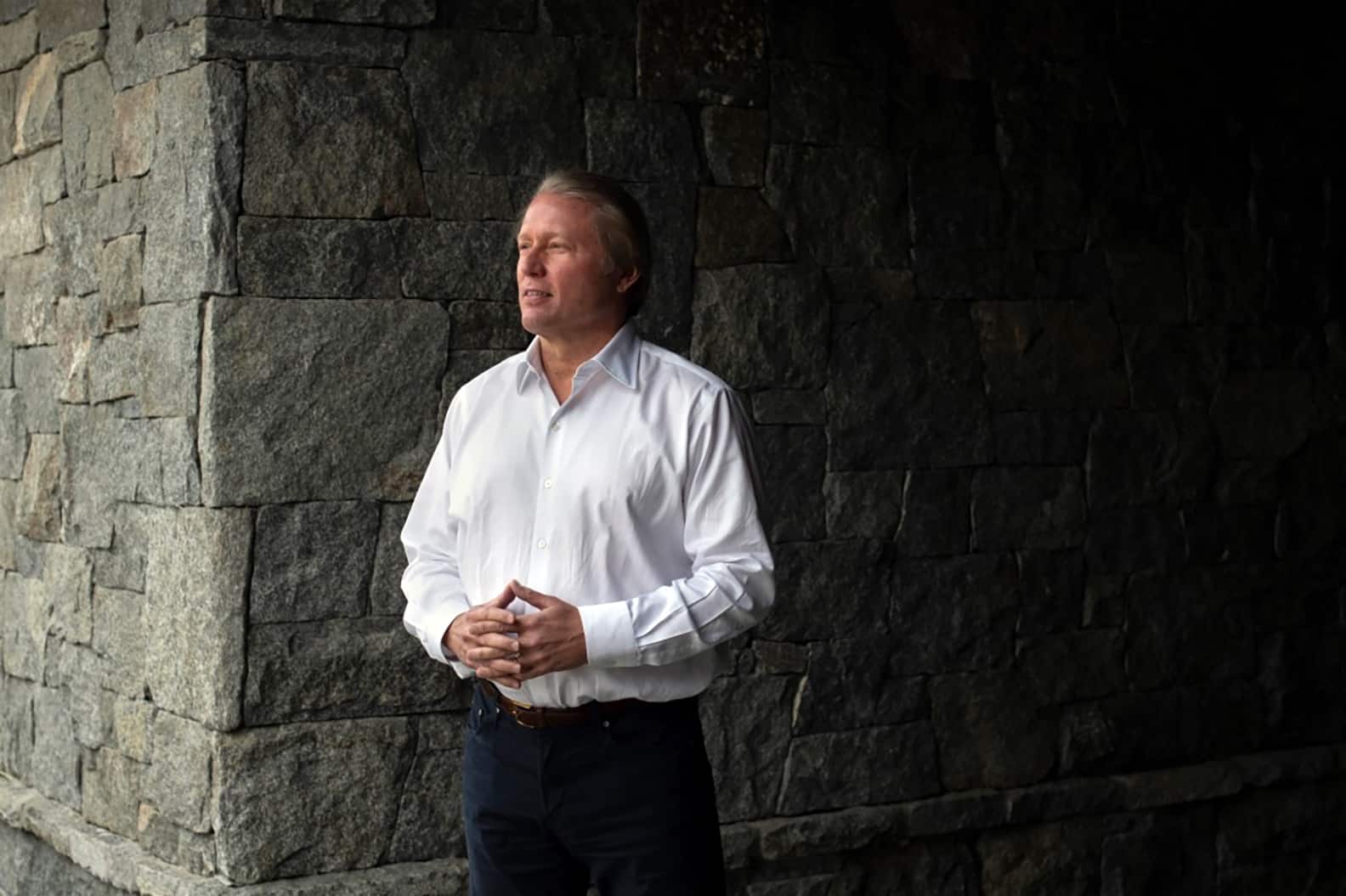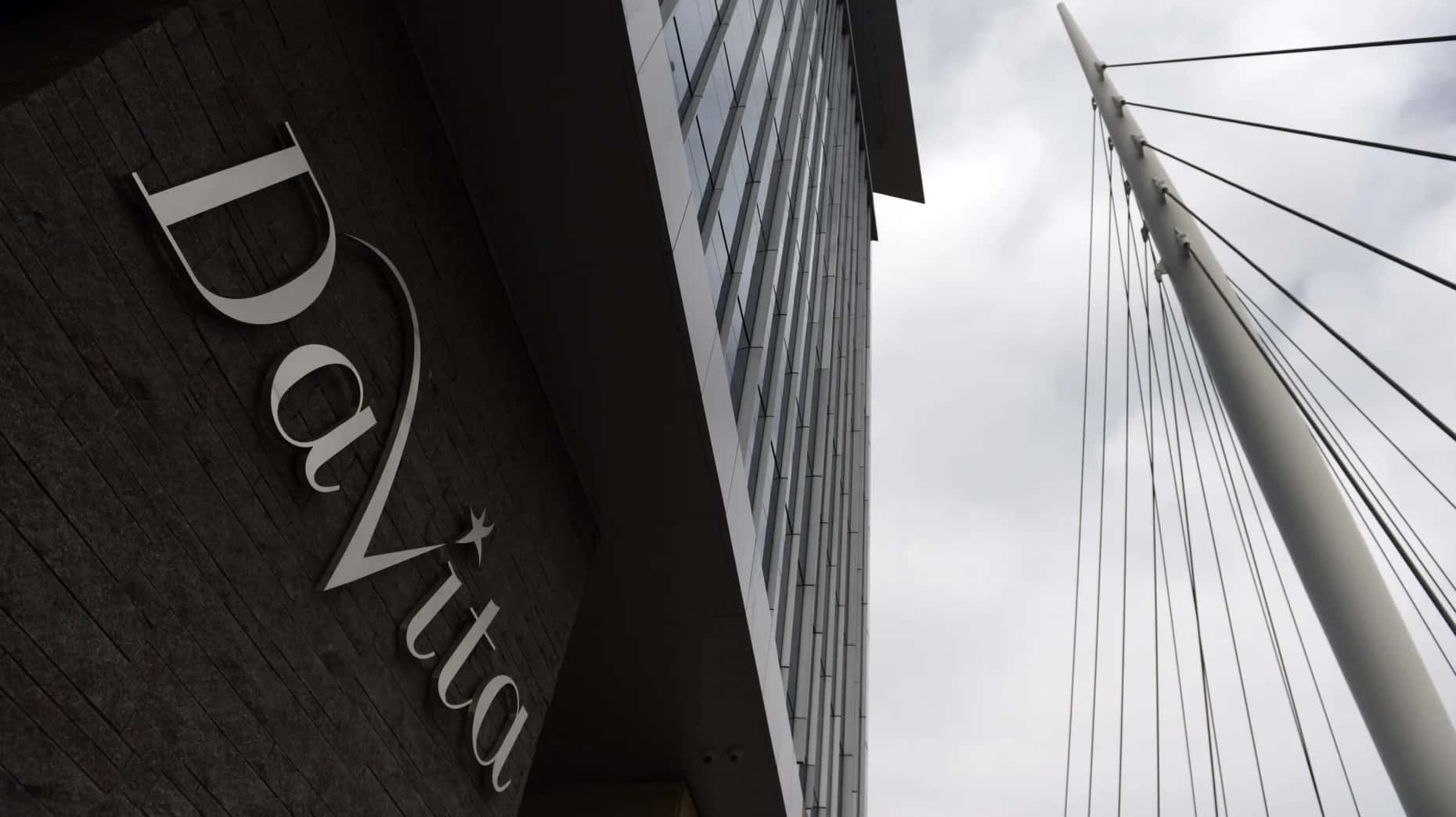
Kent Thiry, former CEO of the dialysis giant DaVita, faces up to 30 years in prison if convicted on all three counts of conspiracy in restraint of trade to allocate employees. (Rachel Woolf/Kaiser Health News)
Jurors in the federal criminal trial of DaVita and its former CEO Kent Thiry began deliberating over the defendants’ fate late Wednesday afternoon.
The jurors posed written questions in the morning to an economist who testified for the defense, then listened to four hours of closing arguments from prosecutors and defense attorneys.
The questions before jurors are whether Thiry, when CEO of DaVita during the 2010s, made agreements with three other health care companies — Surgical Care Affiliates, Hazel Health and Radiology Partners — to not recruit each other’s employees and, if so, whether those agreements illegally constricted competition for employees of the four health care companies.
“What’s interesting is, this is very reminiscent of the Salem witch trials,” Thiry’s defense attorney, Juanita Brooks, told jurors Wednesday. “But this isn’t Salem, Massachusetts; this is Denver, Colorado. And this isn’t 1692; this is 2022.”
The case marks the first time in U.S. history that defendants are charged with felonies for creating so-called non-solicitation or non-poaching agreements. Prosecutors allege that DaVita’s agreements violated the Sherman Antitrust Act of 1890, an anti-monopoly law.
“CEOs can’t conspire together. They can’t enter into a backroom deal to put their employees off limits,” prosecutor Anthony Mariano said during closing arguments.
Before that jurors heard again from Pierre Cremieux, the only witness for the defense. Cremieux answered jurors’ written questions about a statistical analysis his company was paid more than $1 million by defendants to conduct. Mariano mockingly called Cremieux the defense’s “million-dollar man.”
Cremieux’s analysis found that turnover rates and pay at DaVita increased during the years when they were allegedly colluding with the other companies. Cremieux said that when there are agreements that harm competition for employees, turnover and compensation decrease. This was proof, he testified, that DaVita did not have illegal agreements with other companies.

The DaVita headquarters in downtown Denver as seen in this file photo. (RJ Sangosti/The Denver Post)
In his closing argument, Mariano painted Thiry as a bitter, mercurial CEO who would become livid when employees tried to leave “The Village,” as Thiry called DaVita. Thiry wanted to “control” DaVita’s employees “like pieces on a chessboard,” Mariano alleged.
Mariano said the non-solicitation agreements were “backroom deals” between Thiry “and his CEO buddies” that “stole” career opportunities from hard-working, honest DaVita employees.
“When his employees aren’t looking, he tries to take their opportunities away,” Mariano said.
“DaVita employees were cheated out of jobs because the mayor of The Village decided they couldn’t leave and that’s a big deal because we’re talking about people’s livelihoods. Real people who had opportunities stolen because Kent Thiry didn’t want to compete,” he said.
John Dodds, an attorney for DaVita, called Mariano’s presentation “long on outrage and short on facts.” He accused prosecutors of ginning up anger at Thiry but acknowledged that “Kent Thiry behaved badly, he reacted badly” to employees leaving DaVita and Dodds conceded that some DaVita employees were negatively impacted. “It looks bad,” Dodds said of the agreements.
But the agreements were not illegal, he said, because there was no intent to curb competition for employees.
“The question is, what did they understand they were doing then?” he asked. “Because unless all of the alleged conspirators … understood at the time that what they were trying to do was end meaningful competition, your verdict must be not guilty. That’s the heart of this case. That’s the pivotal question that you have to answer in order to render your verdict here.”
Dodds said that several witnesses for the prosecution were asked during the trial whether they were trying to end competition for employees through the non-solicitation agreements and all said they were not.
“It is clear from the testimony of the people (making agreements) at that time that this was about competition. It was about giving DaVita the ability to compete,” Dodds added. “It may have been the wrong way to do it, it may have been a messy way to do it. But the question is, what was the purpose of it? And that’s what the purpose of it was.”

Kent Thiry, former CEO of the dialysis giant DaVita, faces up to 30 years in prison if convicted on all three counts of conspiracy in restraint of trade to allocate employees. (Rachel Woolf/Kaiser Health News)
Jurors in the federal criminal trial of DaVita and its former CEO Kent Thiry began deliberating over the defendants’ fate late Wednesday afternoon.
The jurors posed written questions in the morning to an economist who testified for the defense, then listened to four hours of closing arguments from prosecutors and defense attorneys.
The questions before jurors are whether Thiry, when CEO of DaVita during the 2010s, made agreements with three other health care companies — Surgical Care Affiliates, Hazel Health and Radiology Partners — to not recruit each other’s employees and, if so, whether those agreements illegally constricted competition for employees of the four health care companies.
“What’s interesting is, this is very reminiscent of the Salem witch trials,” Thiry’s defense attorney, Juanita Brooks, told jurors Wednesday. “But this isn’t Salem, Massachusetts; this is Denver, Colorado. And this isn’t 1692; this is 2022.”
The case marks the first time in U.S. history that defendants are charged with felonies for creating so-called non-solicitation or non-poaching agreements. Prosecutors allege that DaVita’s agreements violated the Sherman Antitrust Act of 1890, an anti-monopoly law.
“CEOs can’t conspire together. They can’t enter into a backroom deal to put their employees off limits,” prosecutor Anthony Mariano said during closing arguments.
Before that jurors heard again from Pierre Cremieux, the only witness for the defense. Cremieux answered jurors’ written questions about a statistical analysis his company was paid more than $1 million by defendants to conduct. Mariano mockingly called Cremieux the defense’s “million-dollar man.”
Cremieux’s analysis found that turnover rates and pay at DaVita increased during the years when they were allegedly colluding with the other companies. Cremieux said that when there are agreements that harm competition for employees, turnover and compensation decrease. This was proof, he testified, that DaVita did not have illegal agreements with other companies.

The DaVita headquarters in downtown Denver as seen in this file photo. (RJ Sangosti/The Denver Post)
In his closing argument, Mariano painted Thiry as a bitter, mercurial CEO who would become livid when employees tried to leave “The Village,” as Thiry called DaVita. Thiry wanted to “control” DaVita’s employees “like pieces on a chessboard,” Mariano alleged.
Mariano said the non-solicitation agreements were “backroom deals” between Thiry “and his CEO buddies” that “stole” career opportunities from hard-working, honest DaVita employees.
“When his employees aren’t looking, he tries to take their opportunities away,” Mariano said.
“DaVita employees were cheated out of jobs because the mayor of The Village decided they couldn’t leave and that’s a big deal because we’re talking about people’s livelihoods. Real people who had opportunities stolen because Kent Thiry didn’t want to compete,” he said.
John Dodds, an attorney for DaVita, called Mariano’s presentation “long on outrage and short on facts.” He accused prosecutors of ginning up anger at Thiry but acknowledged that “Kent Thiry behaved badly, he reacted badly” to employees leaving DaVita and Dodds conceded that some DaVita employees were negatively impacted. “It looks bad,” Dodds said of the agreements.
But the agreements were not illegal, he said, because there was no intent to curb competition for employees.
“The question is, what did they understand they were doing then?” he asked. “Because unless all of the alleged conspirators … understood at the time that what they were trying to do was end meaningful competition, your verdict must be not guilty. That’s the heart of this case. That’s the pivotal question that you have to answer in order to render your verdict here.”
Dodds said that several witnesses for the prosecution were asked during the trial whether they were trying to end competition for employees through the non-solicitation agreements and all said they were not.
“It is clear from the testimony of the people (making agreements) at that time that this was about competition. It was about giving DaVita the ability to compete,” Dodds added. “It may have been the wrong way to do it, it may have been a messy way to do it. But the question is, what was the purpose of it? And that’s what the purpose of it was.”
